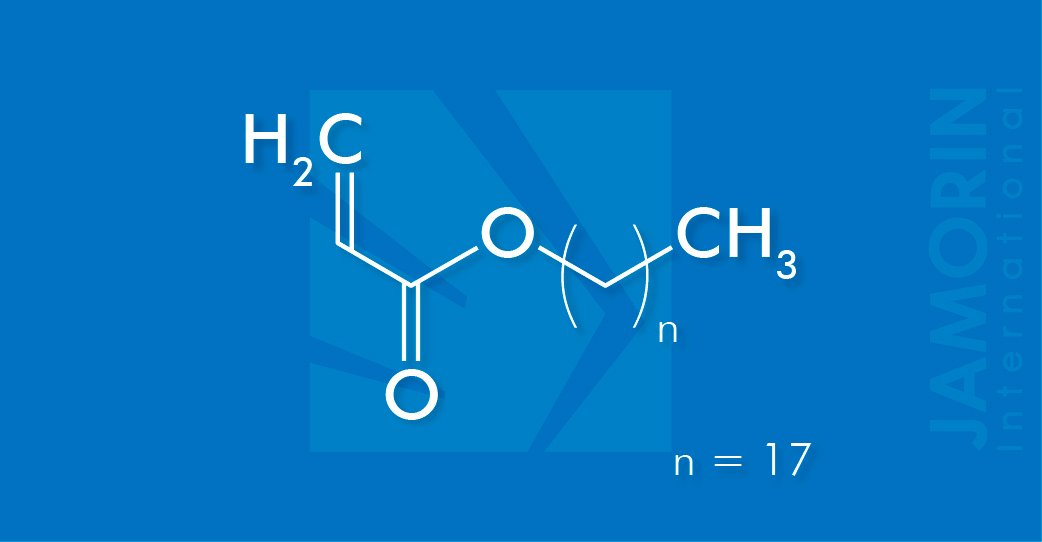C21H40O2
min. 92%
C21H40O2
min. 92%
Stearyl Acrylate 18 (SA 18)
Stearyl Acrylate 18 (SA 18) is an ester of Acrylic acid and is used as a raw material component in the synthesis of polymers. Stearyl Acrylate 18 (SA 18) is a monofunctional monomer with a characteristic high reactivity of acrylates and a long hydrophobic moiety. Stearyl Acrylate 18 (SA 18) forms homopolymers and copolymers. Copolymers of Stearyl Acrylate 18 (SA 18) can be prepared with (meth)acrylic acid and its salts, amides, and esters, and with methacrylates, acrylonitrile, maleic acid esters, vinyl acetate, vinyl chloride, vinylidene chloride, styrene, butadiene, unsaturated polyesters and drying oils, etc.
Stearyl Acrylate 18 (SA 18) is a very useful starting material for chemical syntheses because it readily undergoes addition reactions with a wide variety of organic and inorganic compounds.
Product Type: Acrylate monomer
Features & Benefits:
- Chemical resistance
- Hydrophobicity
- Low Shrinkage
- Flexibility
- Impact resistance
- Weatherability
Characteristics:
- Stearyl Acrylate 1618 (SA 1618) is used in pour-point depressants, slip-coatings, adhesives, oil additives, and emulsifiers. Stearyl Acrylate 1618 (SA 1618) can be used in release paper coatings.
It is applied in the production of:
- Personal care
- Coatings and inks
- Leather & Textile
- Lubricants
- Oilfield
- Adhesives & Sealants
- Rad / UV Cure
Chemical Properties:
-
Puritymin. 92%
-
Acid Valuemax. 0.05%
-
Water contentmax. 0.1%
-
Color APHAmax. 125
Physical Properties:
-
AppearanceClear, pale yellow
-
Physical formSolid, solidified, viscous, paste
-
OdorStrong specific, acrylic-like
-
Molecular weight324.6 g/mol
-
Tg– 58 °C
-
Density0.904 g/cm3 at 20 °C
-
Boiling Point160 °C at 3 hPa
-
Freezing Point22 °C
-
Flash pointnot applicable
-
Melting Point25 °C
-
Viscositynot applicable, the product is a solid
-
Vapor Point0.00000413 hPa at 20 °C
-
pHapprox. 7
-
Peroxide content (ISO 3960)max. 5 ppm
In order to prevent polymerization, Stearyl Acrylate 18 (SA 18) must always be stored under air, and never under inert gases. The presence of oxygen is required for the stabilizer to function effectively. It has to contain a stabilizer and the storage temperature must not exceed 35 °C. Under these conditions, the storage stability of one year can be expected upon delivery. In order to minimize the likelihood of over storage, the storage procedure should strictly follow the “first-in-first-out” principle.If Stearyl Acrylate 18 (SA 18) is crystallized the product can be melted safely with heating temperatures up to 60 °C. It should not be stored at this temperature for more than 5 days in order to prevent degradation in quality and premature formation of polymer fractions. In order to reduce the thermal stress during the melting process, air convection should be very good. Under such favorable conditions, melting can be achieved within 24 hours.The preferred construction material for tanks and pipes is stainless steel. Carbon steel is also acceptable, although the formation of rust may be a problem with product quality (color). Iron(III)-ions have been shown to be a weak polymerization initiator. If carbon steel is to be used, special procedures should be used to prepare the tank for use. Storage tanks, pumps, and pipes should be earthed.
Storage & Handling:
In order to prevent polymerization, Stearyl Acrylate 18 (SA 18) must always be stored under air, and never under inert gases. The presence of oxygen is required for the stabilizer to function effectively. It has to contain a stabilizer and the storage temperature must not exceed 35 °C. Under these conditions, the storage stability of one year can be expected upon delivery. In order to minimize the likelihood of over storage, the storage procedure should strictly follow the “first-in-first-out” principle.If Stearyl Acrylate 18 (SA 18) is crystallized the product can be melted safely with heating temperatures up to 60 °C. It should not be stored at this temperature for more than 5 days in order to prevent degradation in quality and premature formation of polymer fractions. In order to reduce the thermal stress during the melting process, air convection should be very good. Under such favorable conditions, melting can be achieved within 24 hours.The preferred construction material for tanks and pipes is stainless steel. Carbon steel is also acceptable, although the formation of rust may be a problem with product quality (color). Iron(III)-ions have been shown to be a weak polymerization initiator. If carbon steel is to be used, special procedures should be used to prepare the tank for use. Storage tanks, pumps, and pipes should be earthed.
A Safety Data Sheet has been compiled for Stearyl Acrylate 18 (SA 18) that contains up-to-date information on questions relevant to safety.
The data contained in this publication are based on our current knowledge and experience. In view of the many factors that may affect processing and application of our product, these data do not relieve processors from carrying out their own investigations and tests; neither do these data imply any guarantee of certain properties, nor the suitability of the product for a specific purpose. Any descriptions, drawings, photographs, data, proportions, weights etc. given herein may change without prior information and do not constitute the agreed contractual quality of the product. It is the responsibility of the recipient of our products to ensure that any proprietary rights and existing laws and legislation are observed.
